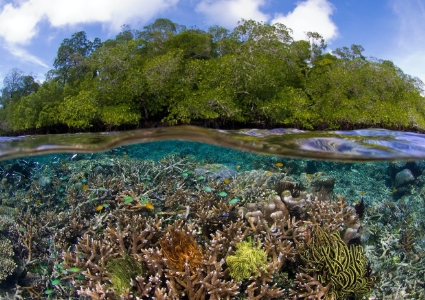Pledging
These are the original issues in this subcategory

You May Pledge Your Support For This Issue With A Monetary
Donation And By Writing A Letter To Your Representatives
- WETLANDS MITIGATION BANKING
- WETLANDS CONSERVATION
- BLUE CARBON

Carbon sinks are natural systems such as forests and oceans which absorb and store carbon dioxide. Plants consume atmospheric CO2 for photosynthesis, and some of this carbon is transferred to the soil as it dies and decomposes. Blue carbon is the carbon stored and sequestered in coastal ecosystems such as mangrove forests, tidal marshes, seagrasses, kelp forests and other tidal or salt-water wetlands. These plants sequester CO2 from the atmosphere, accumulate carbon in biomass for years or decades, and then transfer carbon to sediments where it can be stored for several thousand years. In a short time, new layers of soil accumulate, allowing for further plant growth and carbon sequestration. It is believed blue carbon ecosystems can sequester carbon at concentrations up to five times greater than that of forests. Advocates say 83% of the world’s carbon circulates through the ocean, and half of it is sequestered by these coastal habitats which make up only 2% of the world’s total ocean area.
Pending Legislation: H.R.2750 - Blue Carbon for Our Planet Act
Sponsor: Rep. Suzanne Bonamici (OR)
Status: House Subcommittee on Environment (Science, Space, and Technology)
Chair: Rep. Paul Tonko (CA)
Tweet
Pending Legislation: H.R.2750 - Blue Carbon for Our Planet Act
Sponsor: Rep. Suzanne Bonamici (OR)
Status: House Subcommittee on Environment (Science, Space, and Technology)
Chair: Rep. Paul Tonko (CA)
Tweet
- I oppose reforming current blue carbon policy and wish to donate resources to the campaign committee of Speaker Nancy Pelosi (CA).
- I support establishing an Interagency Working Group on Coastal Blue Carbon to: 1.) Strengthen federal research on blue carbon. 2.) Create a national map and inventory of coastal blue carbon ecosystems and their sequestration potential. 3.) Improve protections for existing coastal blue carbon ecosystems, with a national goal of conserving at least 30% of the ocean and coastal blue carbon ecosystems by 2030. 4.) Restore and expand degraded coastal blue carbon ecosystems. 5.) Assess the long-term effects of containment of carbon dioxide in a deep seafloor environment - on marine ecosystems. 6.) Provide for the long-term stewardship and standardization of coastal blue carbon data. And wish to donate resources to the campaign committee of Rep. Paul Tonko (CA) and/or to an advocate group currently working with this issue.
- I support establishing an Interagency Working Group on Coastal Blue Carbon to:
1.) Strengthen federal research on blue carbon.
2.) Create a national map and inventory of coastal blue carbon ecosystems and their sequestration potential.
3.) Improve protections for existing coastal blue carbon ecosystems, with a national goal of conserving at least 30% of the ocean and coastal blue carbon ecosystems by 2030.
4.) Restore and expand degraded coastal blue carbon ecosystems.
5.) Assess the long-term effects of containment of carbon dioxide in a deep seafloor environment - on marine ecosystems.
6.) Provide for the long-term stewardship and standardization of coastal blue carbon data.
And wish to donate resources to the campaign committee of Rep. Paul Tonko (CA) and/or to an advocate group currently working with this issue.
Donation And By Writing A Letter To Your Representatives
Please login to pledge
Pledge Period - Opening Date
June 21, 2021
Pledge Period - Closing Date
June 27, 2021
Trustee Election - Begins
June 28, 2021
Suggest a worthy trustee for consideration before Day 16 of this presentation cycle. (Maximum 60 Characters)